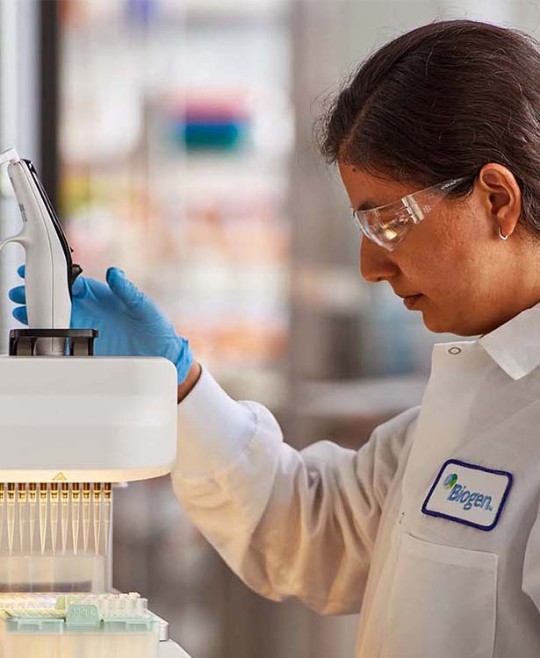Disease Areas
Alzheimer’s Disease

Alzheimer’s Disease
Alzheimer’s disease, the most common form of dementia, is a progressive neurological illness that impairs thinking and the independence of millions of people. Today more than 55M people have dementia worldwide, with 60-70% of cases being Alzheimer’s disease.1
Alzheimer’s disease is usually diagnosed in people 65 years and older, but it may start earlier, with subtle neurological changes occurring years or even decades before symptoms appear. Many people can experience the early, often unrecognized signs of mild cognitive impairment without realizing.
Our Approach
Driven by our commitment to patients and our strong business foundation, we’re dedicated to furthering Alzheimer’s disease research and advancing our pipeline. We aim to help address the unmet needs in this devastating condition, with an emphasis on the earliest stages of the disease.
Before the introduction of therapies directed at amyloid plaques, a key pathology in the disease, little had changed in the understanding and approach to treating Alzheimer’s disease. There are other key pathologies in Alzheimer's disease and with advances in research it may take a multi-modality approach to treat the disease in the future.
Innovative Research
We understand how incredibly challenging it is to treat this complex condition, which is why we will never stop innovating for patients, families and providers in the Alzheimer’s disease community.
We’re advancing research to help diagnose Alzheimer’s disease with the use of blood-based biomarkers as well as investigate drugs directed at tau pathology. While amyloid plaques can build up in the brain for years with no outward signs of the disease, tau is more closely linked to the onset of symptoms. 4
We are currently conducting clinical trials to evaluate the efficacy and safety of investigational drugs in our pipeline for people living with Alzheimer’s disease.
Living with Alzheimer’s disease: Barry’s story
Barry was 61 years old when he was diagnosed with Alzheimer’s disease. He and his husband, Randy, had recently moved to an idyllic new town on Cape Cod, excited to start a new chapter in their lives. The diagnosis meant that he not only had to give up his job, but also his plans for the future. Worried about the loss of awareness of himself and his life that would ultimately come, Barry prepared his will, and visited assisted living facilities. Making these decisions now gives him a sense of comfort that he is still in control of his own life.
Understanding Alzheimer’s Disease
As people get older, they may notice changes in memory and thinking abilities. At first, these changes may be so subtle that they’re easy to explain as normal aging — and they may be. However, it’s also possible that they’re the earliest symptoms of Alzheimer’s disease.
Resources for People Living With Alzheimer’s Disease
Deciding to participate in a clinical trial requires careful consideration. In most cases, the drugs investigated in clinical trials are not yet approved by regulatory agencies like the Food and Drug Administration (FDA) in the United States. The benefits and risks of taking the treatment are not completely known. By volunteering for a clinical trial, you are helping the medical community determine whether new treatments are safe and effective.
Learn more about clinical trials
View all recruiting Alzheimer’s disease clinical trials
For additional questions, contact our Patient Center at patientcenter@biogen.com
Biogen has signed agreements with the National Association of Free and Charitable Clinics (NAFC), which is focused on addressing health disparities and access. NAFC has a large network of clinics across the country, with teams that will provide appropriate information and education about Alzheimer’s disease and support cognitive screening.
Biogen’s commitment to health equity is rooted in efforts focused on providing culturally competent resources and care, offering cognitive testing, engaging with community health centers and, when possible, mitigating out-of-pocket costs for patients and families.
Facts and Figures
60-70%
Alzheimer's disease is the most common cause of dementia, accounting for an estimated 60–70% of cases worldwide.1
1 in 3
1 in 3 seniors dies with Alzheimer's or another dementia.2.
>80%
More than 80% of Americans know little or are not familiar with mild cognitive impairment (MCI), which can be an early stage of Alzheimer’s.1
1. World Health Organization, “Dementia.” Dementia, World Health Organization, 2023, https://www.who.int/news-room/fact-sheets/detail/dementia .
2. Alzheimer's Association, “2023 Alzheimer’s Disease Facts and Figures Report – At a Glance Statistics.” 2022 Alzheimer’s Disease Facts and Figures Report – At a Glance Statistics, Alzheimer's Association, 2023, https://alz.org/media/Documents/Facts-And-Figures-2023-At-A-Glance-Stats-Fact-Sheet.pdf.
3. Alzheimer’s Association, “Mild Cognitive Impairment (MCI).” Mild Cognitive Impairment (MCI), Alzheimer’s Association, 2023, https://www.alz.org/alzheimers-dementia/what-is-dementia/related_conditions/mild-cognitive-impairment.
4. BrightFocus. Foundation. Tau Protein and Alzheimer’s Disease: What’s the Connection? Tau Protein and Alzheimer’s Disease: What’s the Connection? | BrightFocus Foundation. Accessed September 2023.




